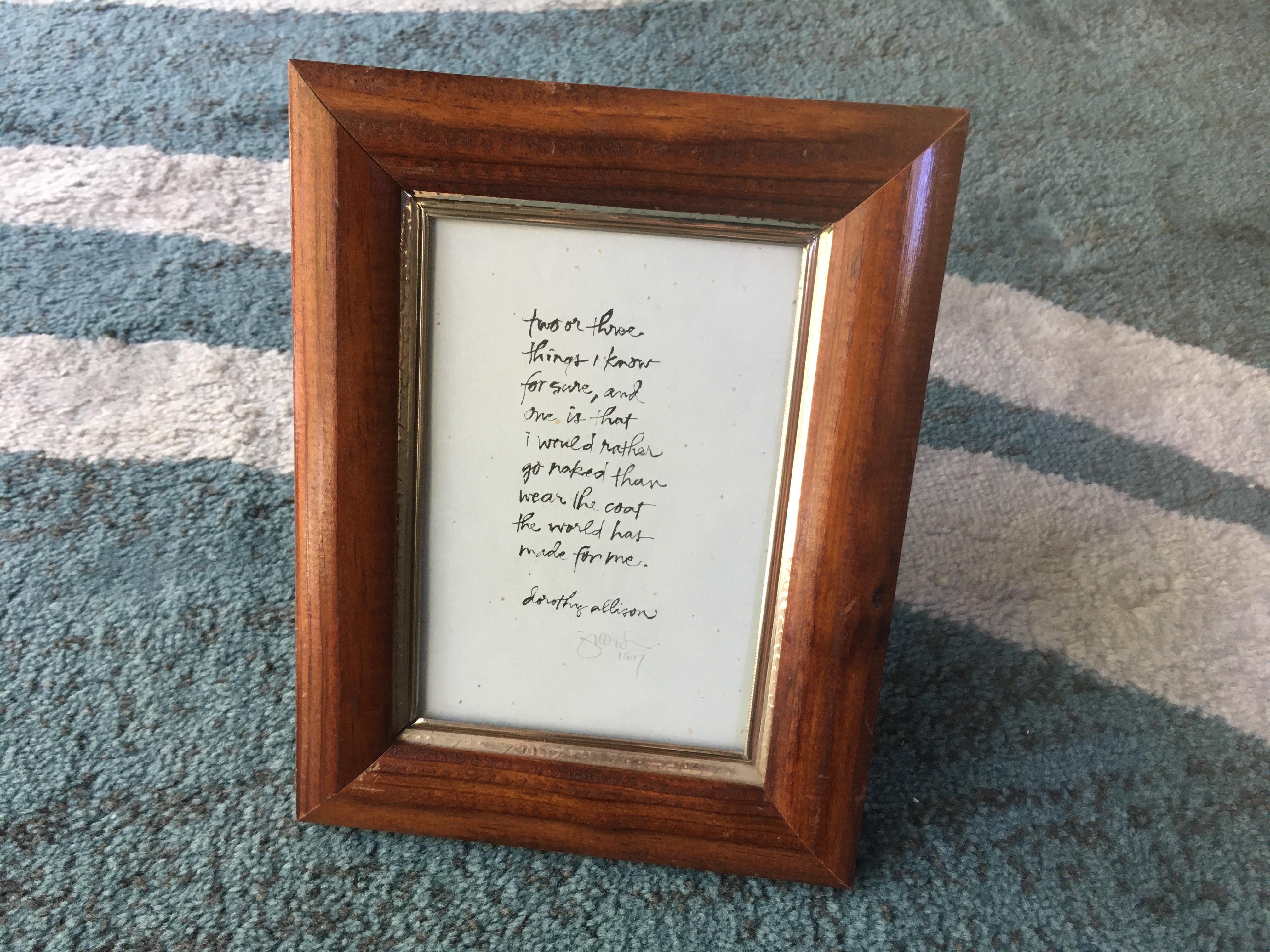
“I would rather go naked than wear the coat the world has made for me.”
Novelist Dorothy Allison wrote those words, and my sister Judith sent them to me, lettered and framed, when I became a Professional Poker Player. That was in 1990. I was 32.
This was Jude’s way of saying, “I get it. I support what you’re doing. Don’t let them make you into what they think you should be.”
My sister’s message was a bit headier than where my head was at. All I wanted was to play poker all day every day until I died, which meant that if I could pay my bills from my poker winnings, I was guaranteed eternal happiness.
And I was not alone. Lots of players shared my dream – to achieve financial freedom, and emotional freedom, by walking the path of poker. To go naked.
At some point on that path, this conversation happens, between the budding poker pro and one or both parental units:
The parent says, “I’m worried about you. I’m afraid you are turning into a gambling addict.”
And the offspring replies: “But it’s not gambling! Not the way I play poker. It’s more like… justice in motion.”
And the parent thinks, “It’s even worse than I thought. My child is in complete denial. They actually believe that betting money on a card game is not gambling.”
While at the same time, the budding poker pro thinks, “They’ll never get it. None of them. My family wouldn’t know an EV calculation if it bit ‘em on their polarized ranges.”
And then there’s your friends and new contacts that you have to explain this to. Here’s an email excerpt from a client that captures the issue perfectly:
I hate that look people give me when I try to explain short-term luck and long-range edge. They look at me like I’m a moron when I’m basically explaining to them the meaning of life.
I remember feeling exactly like that. Defensive, agitated, and superior. “Poker is a game of decisions!” I would exclaim. “Whoever makes the best decisions gets the money! Can’t you see?”
If only they would open their eyes. But it’s tough. It’s tough to convince the uninitiated that poker is a game of choice, not chance.
But at least today you can point to successful pros as proof that it’s possible. Imagine a time before Phil Ivey. Before poker on TV. Before – and I know this is hard to fathom – before rakeback. Back then, when I was trying to explain my new life as a poker pro to my friends and family, there were only 400 pros in the whole country. In that world, if a guy called himself a professional poker player, men raised their eyebrows and women raised their shields.
These days, not so much. What used to be a club for degenerates only now let’s anybody in. I had a father write to me about his son. The father had planned to bankroll his son in law school, and now he wanted to support his son’s poker career instead, by hiring me to coach him.
Why do you think the father was convinced that his son could thrive as a poker pro? Do you think it was wishful thinking? That he had seen some rich young players on TV? And he figured his son was sharp enough to pull it off?
Not even close. The father told me his son had been working his ass off at poker for five years, and for the last 18 months he had been winning steadily, and now he’s ready to take it to next level. The parent had seen, and so believed.
Let’s talk love life. Here’s a crux question I heard from a client:
“How can I get my fiancée to understand that poker is more likely to provide a stable long-range income than working for some asshole who could fire me on a whim?”
And here’s my answer:
If you are a poker pro, or you plan to be, and you enter into a romantic relationship with someone who thinks that reading hands is something fortunetellers do, that’s what writers call “different scripts.” It’s a comedic writing device.
For example, John and Mary are about to meet for the very first time. They’re both excited and nervous. John thinks he’s going on a blind date, and Mary thinks she’s meeting a long-lost half-brother. A messy and hilarious conversation ensues, until something clues them to the mix-up.
In the story of your love relationship that is strained by your poker ambition, the problem is that your scripts don’t match. Your script has you playing stellar poker for decades and making tons of money, and your partner’s script predicts poverty and support groups. But that’s okay, because here’s the great thing about scripts. You can rewrite them.
It’s up to you, and only you – as a player who has adopted the pro mindset – to do the patient work of rewriting scripts for your family, friends, and lovers, however many times it takes, until everyone is reading from the same page. I’m talking about the part of your story when your people stop worrying about what you’re doing and start appreciating what you’ve done.
Only you can quiet the skeptics, and it takes way more than words. The only way to prove to your world that you can live a happy life as a poker pro is to do it.
As they say in the writing trade: Show, don’t tell.
As my clients discover, less pain and more money go together. Coaching by Tommy

Add Comment